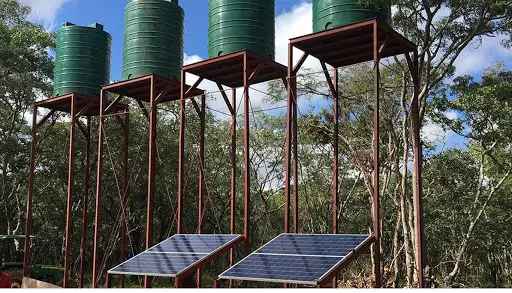Solar-powered boreholes have been installed in Gwanda community, Zimbabwe by a local non-governmental organisation, Hand in Hand Zimbabwe (HiH Zim). The project running under the Green Enterprise Project is meant to transform lives of rural people across the country.
HiH Zim has constructed and installed four solar-powered boreholes at four community gardens in the district, a development that has seen farmers in the area increase crop production. Gwanda, which falls within agro-ecological Region V and receives annual average rainfall of 477mm, has the highest record of crop failure.
The district has not experienced above normal rainfall over the past 10 years and meaningful crop production is only under irrigation. The installation of the solar boreholes has, however, brought relief to villagers, many who struggled to sustain their crops as they had to travel long distances to fetch water.
Also Read: Cameroon rehabilitates the Ndjoré water catchment station
Green Enterprise Project
HiH Zim CEO Felix Tete said the provision of the solar-powered boreholes were part of the organisation’s strategy to promote the use of green energy in the district, while at the same time create jobs and build socio-economically resilient communities. “The Green Enterprise Project is proving to be helpful in the district as it has revamped production in our garden,” said Tsamikan Sebata, from Progressive Garden in Ward 14. She further added that, the project has also empowered the youth, and families as well as the entire community in terms of job creation and building socio-economic resilience.
Since its inception more than 15 months ago, the Green Enterprise Project has established three apiaries, five tree nurseries, and five nutritional gardens with a provision of fodder for cattle and goat fattening. The project is one of the economically and environmentally viable projects that was adopted by HiH Zim as a pilot venture in Gwanda. The project was initiated in September 2018 and is expected to run until August 2021. It seeks to achieve improved sustainable economic activities and strengthen resilience to climate change for the resource-constrained communities; particularly women and young people.

